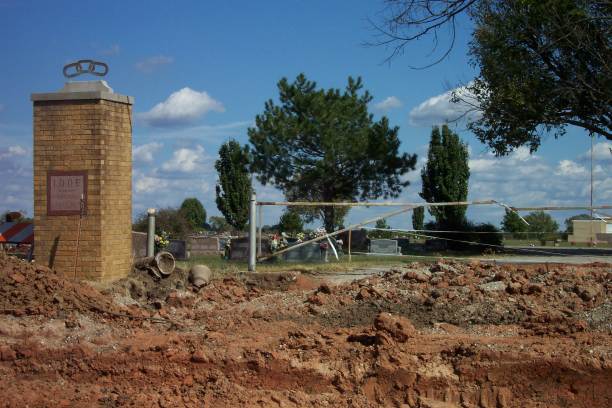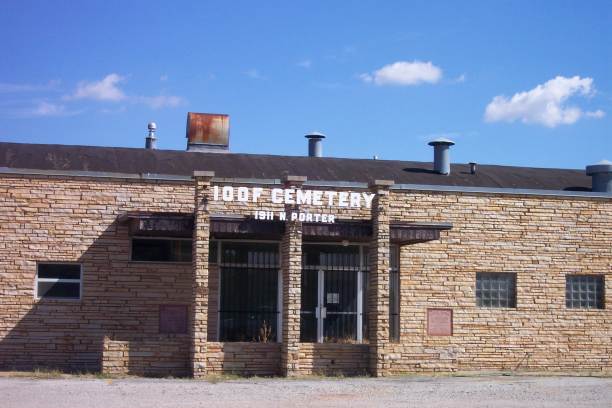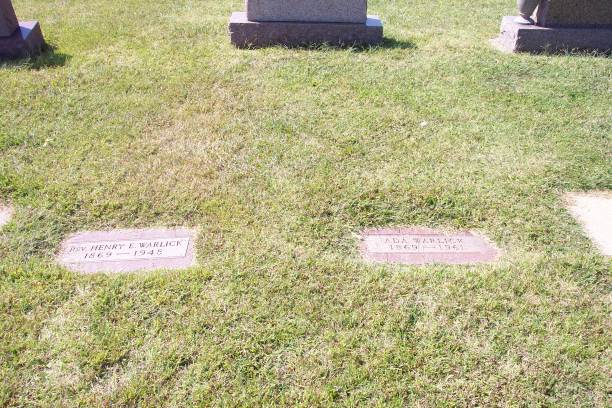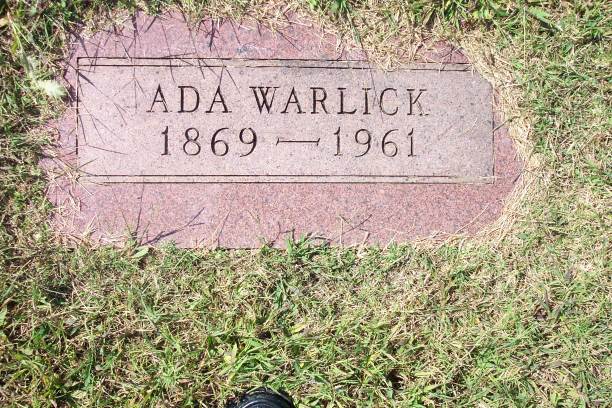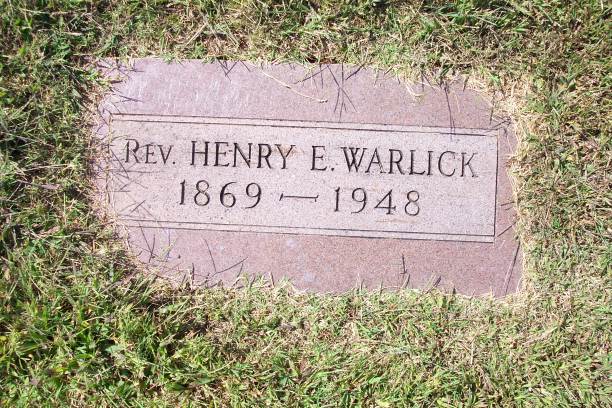Henry Eden Warlick
1868-1948
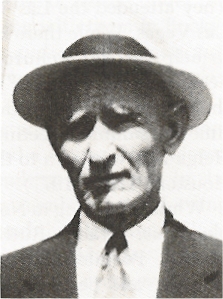
Sketch On The Life Of Henry E. Warlick
Henry Eden Warlick, a double cousin of the inimitable Joe S. Warlick, was one of the most useful and productive gospel preachers in early day central and Western Oklahoma.
He successfully held many debates with the forces of error, and did much productive evangelistic work in that new country in the early years of this century. In his debating he was not so well known as his cousin, Joe S., but the truth did not suffer in his hands.
He knew and believed the gospel. In her book, Gospel Preachers Who Blazed The Trail, published in 1911, Sister C.R. Nichol said of him: "Brother Warlick is one of our strongest men and most successful preachers."
Henry Warlick was born March 3, 1868 in Jackson county Arkansas. His parents were Mr. and Mrs. Jim Warlick, faithful Christians. They had six other sons and two daughters. In 1880, when Henry was twelve years old, the family moved to Texas, settling near Springtown, Northwest of Ft. Worth. In 1887 at the age of nineteen, he obeyed the gospel and was immersed by the late J.D. Tant. The following year he began preaching, and so continued to the end of his life. Most preachers of his time did not do what we now call "local preaching," but preached by Sunday appointments and conducted evangelistic meetings the summer. When called upon, most of them would meet who ever happened to come along in debate. They usually made their living in some secular calling, and all these things Brother Warlick did. He continued in the available public schools until he was eighteen, when he enrolled in College Hill Institute for one term. In 1892 he was married to Miss Ada Smith, of Springtown. Her parents were John B. and Ada D. Smith, faithful members of The Lord's church. They had come to Texas from Tennessee. Eight children were born to Henry and Ada.
The first land run in Oklahoma took place when the Unassigned Lands were opened to white settlement in 1889. This area was right in the middle of what is now Oklahoma. Brother Warlick was barely old enough to make the run, however, he did not make it, but in 1891 did spend considerable time in the Chickasaw Nation at Pauls Valley where he did much preaching, and possibly was looking for a location for himself. The following year he was married and soon moved from their home in Keeter, Texas to Lexington, Oklahoma, just across the South Canadian river into the Unassigned lands. In Lexington he engaged in the mercantile business, including a drug store, and did all the preaching he was able to do. In these years he made many reports to the Firm Foundation about his work there, and it is to these reports that we are indebted for the information we have about it. In 1894 he reported that there was a church in Lexington that was doing well.
He preached in the school houses, what few there were, and in such neighboring towns as Paoli, Pauls Valley, Maysville, Banner, and New Castle, and was instrumental in planting the cause of New Testament Christianity in many of these places. There were very few preachers in the country, so it was a lonely life for a preacher. In 1894, in an April issue of the Firm Foundation, he said that he met but few preachers, but did mention that he had met three. He named one of them and said that he was a "shaker." (This referred to the "re-baptism" question then raging among the brethren. Accepting people for membership on sect baptism was usually called "shaking them in.") These were years when the battle for the purity of the worship and government of The Church was being waged, and no quarter was given. No faithful preacher could escape the fight on these issues, and Brother Warlick had his share of it. For a time the Lexington church did well, but the forces of digression came in and got in their evil work.
They had captured the work in Purcell, just across the Canadian river from Lexington by the time Brother Warlick got there. One of the things he intended to do was to win it back, but so far as I have been able to learn, he was never able to do that. He did keep them from taking over the Lexington work, though this called for much effort on his part, including a debate on the issues. In April, 1897 he reported in the Firm Foundation that "the Lexington church was at peace as a result of following the things that make for peace." In August of that year he held a meeting in Chickasha, and said that he planned to plant The Church in Norman. In Paoli the brethren owned their meeting house, which had to be among the first so owned in the state.
In October, 1898, he moved his family to Bloomington in Greer county, about nine miles Northwest of Mangum. Here he had a good farm, operated a store, which included the Post Office, while preaching and debating all over the area. Marie, a small town was established and had a Post Office, named for one of his daughters in 1899. The Office was discontinued in 1911. In 1907, the brethren in that area established the Cordell Christian College, with J. H. Lawson as the first President. Brother Warlick was involved in this effort from the very first, and for many years served on it's board as Secretary of the Board. He moved his family to Cordell in 1909 so his children could attend that school. While in Cordell they lost one of their sons. He kept his farm in Greer county and continued to preach there as well as in Washita county, where Cordell is located. He also operated a grocery store in Cordell. He continued to return to Central Oklahoma for work, and in 1910 held meetings in Lexington, Paoli, and Maysville. In 1901 he was scheduled to debate an atheist in Greer county named Welch, but Welch backed out, a thing not altogether uncommon for such men. The same year he debated T. J. Beckham, a Methodist in Greer county. I remember hearing the late Horace Busby tell of hearing Brother Warlick preach in Greer county in those early years. He said that Brother Warlick preached on a Sunday morning in the school house, where he had a regular appointment. Brother Busby had just married and he and his bride were visiting relatives there and went to church with them that Sunday morning. At the conclusion of the sermon different ones began asking Brother Warlick questions, intending to "trip him up". This went on until about the middle of the afternoon. Brother Busby said that Brother Warlick was able to answer each question with a "thus saith the Lord" and give chapter and verse. Of course he "won the day." Horace Busby left the Presbyterian church and became one of our greatest gospel preachers.
At least as early as the Cordell years he became involved in the Oklahoma Cotton Growers Association and the Farmer's Union. He worked for these for many years, perhaps to the end of his life. He knew the farmer's problems, for he was one. He gave lectures and did much writing for their periodicals. In the early thirties, when Bill Murray was governor of Oklahoma, Brother Warlick backed him in the race for that office, for they had been close friends since early life, probably going to school together in the College in Springtown, Texas. Governor Murray appointed several members of The Church to responsible positions in the state government, including Brother Warlick, who served as chief clerk of the Board of Affairs, one of the most important boards in the state government. Here Brother Warlick was able to render unusual and valuable service to the state, and incidentally to The Church. The depression was very bad, and private orphanages were faced with having to close down, due to the difficulty of raising the necessary funds with which to operate. Governor Murray was talking with his advisors about it and said the state would have to take the children from the private orphanages and care for them, which would involve the construction of many buildings on state property. Brother Warlick suggested that the private orphanages already had the buildings, and that it would be better to leave the children where they were, and let the state support them there. This plan was adopted to the benefit of all concerned. One wonders how he found time to do all he did, but along with his other work, he found time to preach and to write for the various "brotherhood papers" from time to time.
Throughout his long life he was involved in the things that were happening in The Church. In January, 1915 he wrote a rather long article for the Firm Foundation about the serious problems Socialism was causing in The Church. This doctrine was quite popular with many, and several of our brethren, including some preachers, were swept away to everlasting ruin by it. Along with other faithful ones, Brother Warlick fought to save The Church from this heresy. Gradually, it subsided, and we have not heard of it for many years. Through all the years he maintained an interest in the Lexington church and often went back there. Later premillennialism was introduced there, and such men as R.H. Boll, Neal, Phillips, Earl Smith and others went there preaching that false and divisive doctrine. In the May 14, 1935 issue of the Firm Foundation he wrote about it under the title, "The Menace of Premillenialism" and gave the Lexington church as an example of the damage it could do. He said, "...we have had a church there since the opening of the territory in 1889. He recalled his hard work there and the struggle to save it from the digressives. They had managed to survive all this, had gotten a good building of their own, but now discord prevails due to this "ism." Will M. Thompson went there to defend the truth and tried to get O. E. Phillips to defend in public debate the position of the premillennialists, but of course he would not do it. J.D. Bland, an elder there, sent to Dallas for a Dr. Wood to come and teach this heresy. Apparently he came and Brother Warlick was asked to come. He went, but again the "pre-mils" again refused to permit a public examination of their doctrine.
He made his home in Norman for many of the last years. Here he continued to preach and debate. He served as an elder in the Central church there. He was an active supporter of the work of John P. Lewis in the School of Religion in Oklahoma University. Even after he passed the three score and ten mark, he continued to debate, meeting M.L. Welch, a Primitive (Hardshell) Baptist in debate at Amber, near Norman.
But time takes it's toll of the human frame, and he was no exception. He did enjoy reasonably good health until close to the end. He became ill, and was treated in hospitals in Oklahoma City and Norman, where on January 23, 1948 God called him home just a few weeks short of the four score mark. His companion continued for a few years, when she too, was called "up higher." Services were conducted by several different preachers, and they both sleep in the Norman cemetery.
May God bless his memory for he was a good man, a faithful Christian and preacher.
-Gospel Preachers Of Yesteryear, Loyd L. Smith, Page 380-384, Originally Published In The Christian Worker, Published February, 1983
![]()
Directions To The Grave Of Henry E. Warlick
H.E. Warlick is buried in the I.O.O.F. Cemetery, Norman, Oklahoma. The I.O.O.F. Cemetery is located south of Oklahoma City, Oklahoma in the town of Norman. Take Exit 114 on I-35. and head east on W. Indian Hills Rd. Go to North Porter Avenue and turn right (south). When crossing over W. Rock Creek Rd. the cemetery will be on the left. Go to the southern end of the cemetery, and the office is in the Norman Monument Company. Enter the cemetery and follow the directions on the map included below. Behind "BETTIS" Headstone.
GPS Coordinates
35°14'43.8"N 97°26'17.5"W
or D.d. 35.245500, -97.438183
![]()
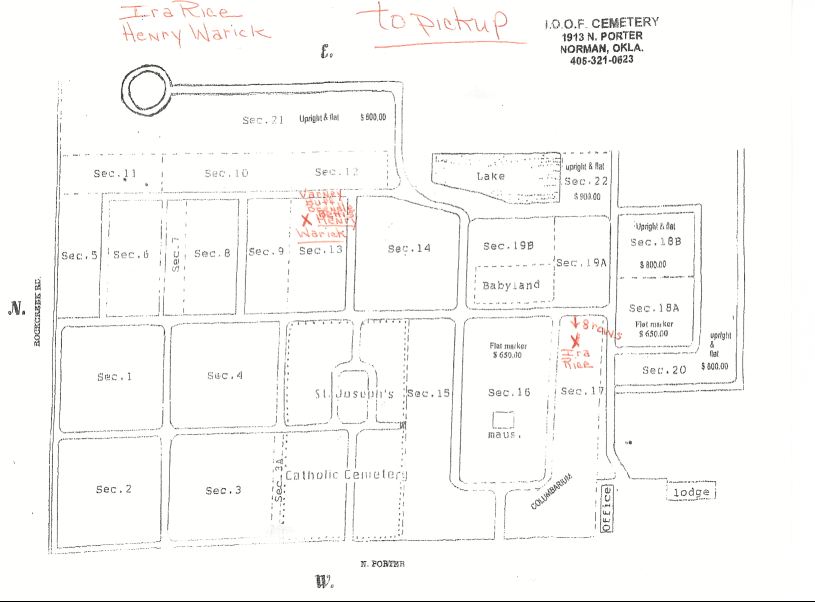
IOOF Cemetery Map - Location Of Graves Of Two Gospel Preachers:
Ira Y. Rice Sr. & Henry E. Warlick
![]()
N. Porter Was Being Worked On When I Visited The Cemetery In 2004
Ada Warlick
1869-1961
Rev. Henry E. Warlick
![]()
